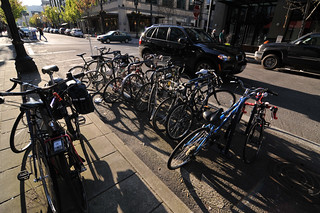Portland’s eight-page bike parking code is overdue for an overhaul. A Portland planning commissioner is organizing a one-night workshop to get things going, and we’re helping.
For three months, we’ve been using BikePortland’s new Real Estate Beat to show how bikes and urban development in central Portland have become joined at the hip in residential, office and retail development alike. And whatever the project, there’s a common theme: What does adequate bike parking look like?
Answering that question has to be part of Portland’s plan to make biking a good option for everyone, says Portland Planning and Sustainability Commissioner Chris Smith.
“We’ve sort of got to the point where it’s possible and somewhat safe, and now we’re going for making it safe and convenient,” Smith said Monday. “Now it’s time to look at parking through that lens.”
Smith reached out to Active Right of Way, a group of “smart people who actually sit around and read code” that arose in 2009 from PSU’s free Traffic and Transportation class, and to Lancaster Engineering, which is hosting as it has previous BikePortland Wonk Nights. We’ll be joining in, too, to cover this proposal as it evolves.
To get your gears turning about how Portland bike parking code could be changed, here are some questions Smith proposed in an email last month:
– Are the parking ratios for commercial buildings sufficient? (they have not been updated recently)
-Do we need specific design standards for wall racks (or limits on what % of parking can be accommodated on wall racks)?
– Do we need provisions for bakfiets and cargo bike parking?
– Should a bicycle parking space be defined in three dimensions rather than as a footprint?
Smith has also suggested that the city’s requirements for transit stations may need some revision.
Smith, who recently started his second four-year term on the planning commission, said his understanding of the importance of bike parking code was shaped by incremental changes the body has made during his first term.
“It used to be one bike parking space for every four units, which was obviously completely inadequate,” Smith said. “We had condos that were converting every square inch to bike parking once people moved in. … It was pretty clear that the market wasn’t figuring things out for themselves.”
Public bike parking is one thing that Portland unquestionably does better than other North American cities — something I was constantly reminded of last week in a trip to Vancouver BC, which is investing rapidly in good bikeways but hasn’t yet dealt with the bikes that are locked to parking meters, street signs and fences throughout its central city. But good private bike parking is something many developers and architects don’t understand yet, even here.
I asked Smith what his mission was for the evening.
“If you’re going to go to the city and say have a couple planners work on this for a couple months, then you’ve got to make a case for why it’s important, as opposed to working on the tree code or something else,” he said. “Once we have the case, I think we’ll plot out the strategy.”
The event is 5:30 to 7:30 p.m. on Tuesday, October 29th, at Lancaster’s office, 321 SW 4th Ave. #400 (right next door to ours!). Everyone’s welcome. The building’s doors lock around 5:30, so if you arrive late, call Lancaster’s Kirk Paulsen at 503-858-2042 or the office phone: 503-248-0313.




